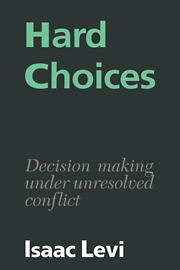Book contents
- Frontmatter
- Contents
- Preface
- 1 MORAL STRUGGLE
- 2 DILEMMAS
- 3 VALUES IN SCIENTIFIC INQUIRY
- 4 CHOICE AND FOREKNOWLEDGE
- 5 VALUE STRUCTURES
- 6 VALUES REVEALED BY CHOICES
- 7 UNCERTAINTY AS A SOURCE OF CONFLICT
- 8 CONFLICT AND SOCIAL AGENCY
- 9 DISTRIBUTING BENEFITS
- 10 UTILITARIANISM AND CONFLICT
- 11 SOCIAL CHOICE THEORY
- 12 CONFLICT AND INQUIRY
- Notes
- Bibiliography
- Name index
- Subject index
3 - VALUES IN SCIENTIFIC INQUIRY
Published online by Cambridge University Press: 05 June 2012
- Frontmatter
- Contents
- Preface
- 1 MORAL STRUGGLE
- 2 DILEMMAS
- 3 VALUES IN SCIENTIFIC INQUIRY
- 4 CHOICE AND FOREKNOWLEDGE
- 5 VALUE STRUCTURES
- 6 VALUES REVEALED BY CHOICES
- 7 UNCERTAINTY AS A SOURCE OF CONFLICT
- 8 CONFLICT AND SOCIAL AGENCY
- 9 DISTRIBUTING BENEFITS
- 10 UTILITARIANISM AND CONFLICT
- 11 SOCIAL CHOICE THEORY
- 12 CONFLICT AND INQUIRY
- Notes
- Bibiliography
- Name index
- Subject index
Summary
Cognitive values
In The Will to Believe, William James wrote:
There are two ways of looking at our duty in the matter of opinion – ways entirely different, and yet ways about whose difference the theory of knowledge seems hitherto to have shown very little concern. We must know the truth; and we must avoid error – these are our first and great commandments as would-be knowers; but they are not two ways of stating an identical commandment, they are two separable laws. …
Believe truth! Shun error! – these, we see, are two materially different laws; and by choosing between them we may end by coloring differently our whole intellectual life. We may regard the chase for truth as paramount, and the avoidance of error as secondary; or we may, on the other hand, treat the avoidance of error as more imperative, and let truth take its chance. (James, 1956: 17–18)
Here James discusses value commitments concerned with the promotion of cognitive values. His rhetoric is infused with moral language, but the duties to which he alludes are “in the matter of opinion” and are not customarily counted as moral. Moreover, James suggests that there are at least two different kinds of cognitive values and that these can come into conflict with one another. On both scores, I think James is right.
- Type
- Chapter
- Information
- Hard ChoicesDecision Making under Unresolved Conflict, pp. 36 - 46Publisher: Cambridge University PressPrint publication year: 1986



